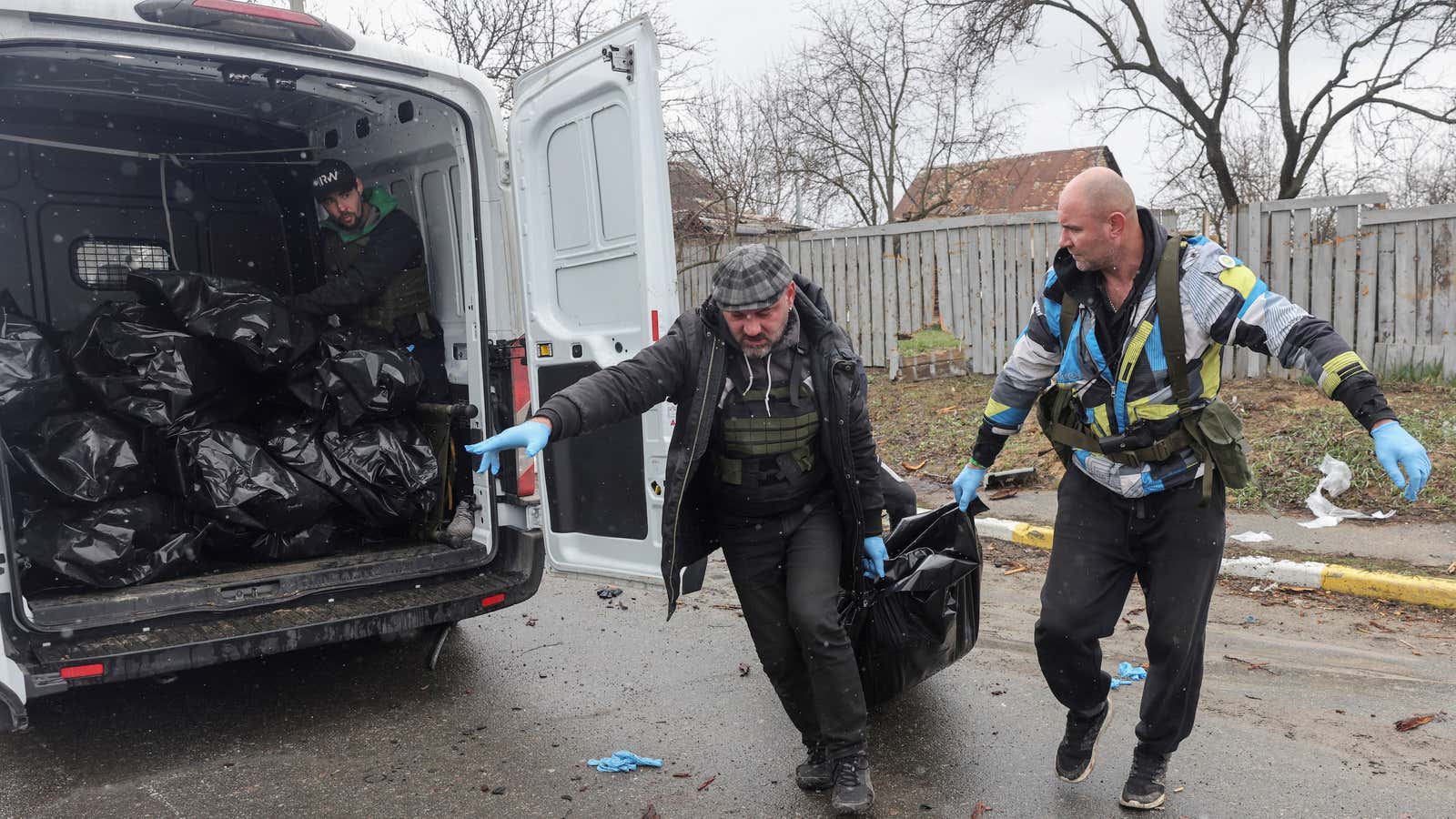New details of Russian war crimes against Ukraine civilians are putting pressure on the international community to intensify sanctions against Russia.
Close to 300 civilians were buried in mass graves in Bucha in the aftermath of Russian troops’ withdrawal from Kyiv suburb last week, according to the Wall Street Journal. On Sunday, Ukraine’s defense ministry also released a video showing the bodies of civilians by the side of the road in Bucha. “Local civilians were being executed arbitrarily, some with hands tied behind their backs, their bodies scattered in the streets of the city,” the ministry wrote on Twitter.
Russia’s defense ministry called photo and video evidence of violence against civilians from Bucha “another staged performance by the Kyiv regime for the Western media.”
A report from Human Rights Watch, also posted on Sunday, included eyewitness accounts of Russian soldiers in occupied regions of Ukraine executing and raping civilians as well as committing other acts of violence.
How Western countries are responding to Russian war crimes
War crimes including the rape, murder, and torture of civilians are prohibited under the 1949 Geneva Conventions, which apply to both Russia and Ukraine. The European Union, as well as the US, the UK, and other countries, accused Russia of committing war crimes last month. But the latest revelations have prompted a new round of condemnations from governments vowing further sanctions against Russia.
On Sunday, Germany’s foreign minister Annalena Baerbock wrote on Twitter, ”Those responsible for these war crimes must be made accountable. We will tighten the sanctions against Russia and will assist Ukraine even more in defending itself.”
UK foreign secretary Liz Truss said in a statement on Sunday that the “indiscriminate attacks against innocent civilians during Russia’s illegal and unjustified invasion of Ukraine must be investigated as war crimes.” Truss also posted on Twitter Sunday that she had spoken with her Canadian counterpart, minister of foreign affairs Melanie Joy, about the need for tougher sanctions against Russia. “Energy dependence on Russia must end to cut off funding to Putin’s war machine,” she wrote.
Many international governments, including the Netherlands and Finland, also expressed support for the International Criminal Court—which is already investigating Russian war crimes against Ukraine—collecting new evidence of atrocities on the ground. US secretary of state Antony Blinken said in a CNN interview Sunday that Russia must be held accountable, a sentiment echoed by French president Emmanuel Macron.
Will the EU join the Russia oil embargo?
A looming question is what tougher sanctions against Russia might look like. Countries including the US and the UK have already placed embargoes on Russian oil, gas, and coal. Poland has announced plans to stop importing Russian crude oil by the end of 2022. And Lithuania on Sunday became the first EU member country to halt domestic imports of Russian oil. “If we can do it, the rest of Europe can do it too,” Lithuanian president Gitanas Nauseda said Saturday.
Getting all of Europe on board with this kind of immediate ban has been difficult, given the region’s heavy dependence on Russian energy. The EU’s economic commissioner said as recently as Saturday that while the bloc was working on further sanctions, “any additional measures will not affect the energy sector,” according to Reuters. German chancellor Olaf Scholz said in late March that an immediate embargo on Russian oil “from one day to the next would mean plunging our country and the whole of Europe into a recession.”
Germany has also said that it’s working to quickly reduce its dependence on Russian oil imports. That’s not fast enough, according to Kyiv mayor Vitali Klitschko. “Not one more cent should go to Russia,” Klitschko said in an interview with the German tabloid Bild, as reported by the Journal. “This is bloody money that’s being used to massacre people.”
Now the tide could be turning, both for Germany and for the EU more broadly. German defense minister Christine Lambrecht said on Sunday that the bloc should now re-up the question of halting Russian oil imports given the news out of Bucha. “Such crimes cannot go unanswered,” she said.
